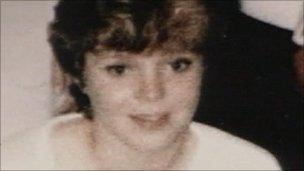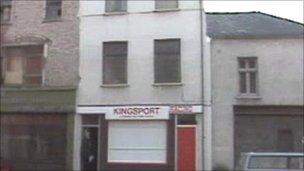Lynette White case: Victim 'not killed over drug debt'
- Published

Lynette White was stabbed more than 50 times in the flat where she worked
A man who spent two years on remand accused of the 1988 murder of Lynette White has denied she was killed because she owed money to a drugs dealer.
John Actie was one of two men acquitted of the Cardiff killing. Three others were wrongly convicted and jailed.
Mr Actie denied a second accusation at Swansea Crown Court that he used his compensation to bribe witnesses in the trial of eight ex-police officers.
The officers deny perverting the course of justice and the trial continues.
Miss White, a prostitute, was stabbed more than 50 times in her Cardiff flat on Valentine's Day, 1988.
Mr Actie, his cousin Ronnie Actie, Stephen Miller, Yusef Abdullahi and Tony Paris became known as the Cardiff Five when they went on trial in 1990 for the murder of Miss White.
Mr Miller, Mr Abdullahi and Mr Paris were convicted and jailed for life but released in 1992 when the Court of Appeal quashed their convictions.
John and Ronnie Actie were acquitted, after spending two years in jail awaiting trial. Mr Actie was awarded £300,000 compensation.
The three surviving members of the Cardiff Five are giving evidence against eight of the former police officers who helped prepare the case against them.
In 2003, advances in DNA led new officers to Jeffrey Gafoor, who admitted the murder and said he had acted alone. He is serving a life sentence.
Mr Actie was further cross examined on Thursday by William Coker QC, the barrister representing former Det Ch Insp Graham Mouncher, who led the murder investigation in late 1988.
Mr Coker asked Mr Actie if he knew anything about Miss White taking drugs or about debts she may have had to a dealer.
Mr Actie replied: "No." He had previously told the jury he had only been on "nodding terms" with her.
He also denied putting pressure on Gafoor to accept sole responsibility for her murder, prompting Mr Coker to claim: "You were covering up in 1990 and you are still hiding something today."
He said: "You know a great deal more about that night than you are prepared to say. You were there. You know what happened. Were you actually involved in the violence?"
'Code of silence'
Mr Actie said it was an impossible suggestion.

The external view of the flat where Lynette White died in February 1988
Mr Coker said: "Was a debt being collected? Was Gafoor being used to get Lynette White into that flat? Was there a code of silence, everyone doing something to the body?"
Mr Actie said he would have to go to prison and ask Gafoor. He said: "We are just going round in circles."
Mr Coker said Mr Actie was also unwilling to reveal everything he knew because it could affect the £300,000 he had received.
Mr Actie said he had also received a written apology from the then chief constable of South Wales Police, Barbara Wilding, and that the money was in a trust fund and would be used not just for himself but also his wife, children, brother and sister.
Mr Coker asked him if he had used the money for any other purpose.
Mr Actie said he had tried to use £30,000 as surety for bail for a friend accused of possessing cocaine with intent to supply, but had been told it was not possible.
Mr Coker asked him if he had tried to "buy influence" in the current trial by offering bribes to witnesses.
Mr Actie said that was "impossible, this is not on." He agreed that, in 1988, he had had a reputation as a "hard man" in Tiger Bay but added: "I haven't got horns coming out of my head."
All the police officers deny conspiracy to pervert the course of justice. One officer also denies two counts of perjury.
Two other people also deny perjury.
- Published28 September 2011
- Published26 September 2011
- Published21 September 2011
- Published20 September 2011
- Published13 September 2011